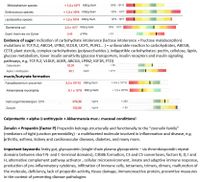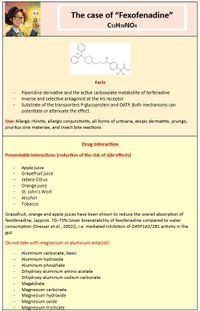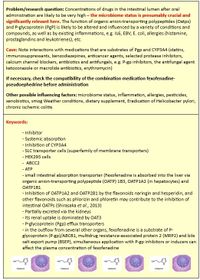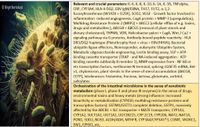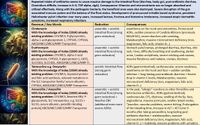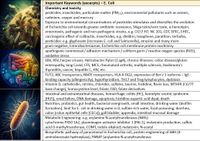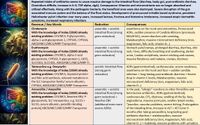Our gut microbiome is an important player in the field of pathological and chronic diseases
Microbiome - Pollutants - E. Coli - EBV - ME/CFS - Long Covid - chronic illnesses - cancer
The Gut Microbiome as a Key to Individualized Medicine: An Urgent Call to Action
The gut microbiome has emerged as a highly relevant field of scientific research, playing a central role in numerous chronic diseases, including Long COVID, Myalgic Encephalomyelitis/Chronic Fatigue Syndrome (ME/CFS), Epstein-Barr virus (EBV)-related conditions, and various forms of cancer. Yet, a crucial aspect remains largely overlooked: the interactions between the microbiome, environmental pollutants, and pharmaceutical therapies.
The Impact of Environmental Factors on the Microbiome
While a healthy diet and lifestyle are fundamental to gut health, they are not sufficient on their own. Exposure to environmental pollutants found in food, water, and air can significantly alter the composition of the microbiome, leading to inflammation, metabolic dysfunctions, and immune system disturbances. A broader scientific perspective is needed to fully grasp these interactions and integrate new insights into medical practice.
Deficiencies in Conventional Medicine: A Necessary Paradigm Shift
An increasingly underestimated issue within guideline-based conventional medicine is the interaction between the microbiome and pharmaceutical prescriptions. Currently, medical practice lacks a systematic integration of microbiome-related findings in drug therapy, despite the critical influence of drug-drug interactions (DDIs) and resistance development on treatment success and adverse effects.
To ensure sustainable improvements in patient care, micronutrient science must become an essential component of clinical and specialized medical practice. Experts in micronutrients and vitamins should play a key role in developing individualized pharmaceutical therapies to optimize treatment outcomes.
Why This Must Be a Priority
The incorporation of comprehensive micronutrient and microbiome assessments before surgery and drug prescriptions could prevent a wide range of severe complications. Inadequate metabolic evaluations frequently result in serious side effects, prolonged hospital stays, and unnecessary additional doctor visits — leading to significant costs for healthcare systems.
In my case, and for many others, this crucial topic has never been addressed prior to surgical procedures or medication prescriptions, with tragic consequences. Severe metabolic disorders could have been avoided with a more holistic approach. The need for a paradigm shift in medical practice cannot be overstated.
Science Must Take Action
Future pharmaceutical prescription practices must integrate a holistic understanding of the gut microbiome, micronutrient balance, and drug interactions. Only by incorporating these factors into medical decision-making can personalized medicine fulfill its potential — benefiting patients and alleviating burdens on global healthcare systems.
A scientific and medical consensus on this issue is urgently required to develop forward-thinking and effective treatment strategies.
Die Microbiomforschung braucht einen 360-Blick - Microbiome research needs a 360-degree view
The Negative Impact of Antibiotic Use on My Gut Microbiome: A Case for a More Holistic Approach in Medicine
The excessive and frequent prescription of antibiotics has had a profound and detrimental effect on my gut microbiome. Over the years, I was repeatedly prescribed antibiotics for a wide range of conditions, including respiratory tract infections, tonsillitis, bronchitis, pneumonia, Chlamydia pneumoniae, middle ear infections, sinusitis, conjunctivitis, genital and urinary tract infections, surgical procedures, dental infections, intestinal infections, and salmonella poisoning. The cycle seemed endless, as antibiotics were prescribed time and again.
Due to the severity of my adverse drug reactions (ADRs), physicians eventually noted in my emergency passport: “Do not use amoxicillin, tetracycline, or doxycycline under any circumstances.” However, beyond this precautionary note, no further action was taken — no comprehensive investigations, no review of potential underlying factors, and no questioning as to why my body reacted so severely to these medications.
A Lack of Consideration for the Gut Microbiome and Micronutrient Deficiencies
None of the prescribing physicians had ever assessed the state of my gut microbiome or evaluated my micronutrient profile. No one checked whether I might already be suffering from severe vitamin D deficiency, folic acid deficiency, low vitamin C levels, or depleted magnesium stores. Additionally, no one investigated whether I had reactivated viral infections such as Epstein-Barr Virus (EBV), Human Herpesvirus 6 (HHV6), or Cytomegalovirus (CMV) — factors that could significantly contribute to immune dysfunction and inflammation.
As a result, the degradation of my gut microbiome continued unchecked, further compromising my immune system — particularly in combination with environmental pollutants. My body's resilience weakened, leaving me increasingly susceptible to chronic illnesses.
The Overlooked Role of Micronutrient-Drug Interactions
Over time, the side effects of my medications intensified. Yet, no medication-oriented and tailored supplementation was ever implemented. Physicians never considered how deficiencies in essential micronutrients and vitamins might exacerbate my drug-related side effects or negatively impact my intermediary metabolism.
Crucially, the interaction between pharmaceuticals and micronutrients was completely ignored — even though both utilize the same signaling pathways. The absence of this fundamental consideration led to repeated ADRs, worsening symptoms, and long-term physiological instability.
The Consequences of Neglecting Medication-Oriented Supplementation
In my case, targeted supplementation based on my medication regimen was never part of clinical drug prescription practices. The result was a dangerous oversight:
- Vital micronutrients and vitamins were never accounted for.
- ADR frequency increased, sometimes reaching life-threatening levels.
- Dose adjustments and micronutrient evaluations were completely absent.
This failure to integrate micronutrient science into pharmacological decisions significantly contributed to my deteriorating health. It underscores the urgent need for a paradigm shift in conventional medicine — one that systematically integrates gut microbiome health, micronutrient profiling, and drug-micronutrient interactions into clinical treatment guidelines.
A Call for Comprehensive Medical Consideration
The gut microbiome is a critical determinant of health, yet it remains largely disregarded in traditional medical approaches. Addressing micronutrient deficiencies and gut microbiome imbalances before initiating pharmacological interventions could prevent severe complications, reduce healthcare costs, and improve patient outcomes.
My experience illustrates a clear gap in medical practice — one that demands immediate attention, scientific innovation, and the adoption of holistic, personalized medicine strategies.
Personalized Prevention Strategies: Insights and Achievements from an Interdisciplinary Self-Help Group
An Integrative Approach to Disease Management
We are a group of individuals who have undergone extensive genetic and laboratory testing to better understand our health conditions. Our diagnoses — including Chronic Fatigue Syndrome (CFS), Epstein-Barr Virus (EBV), Multiple Chemical Sensitivity (MCS), Cancer, Hepatitis and Long COVID —necessitated a preventive and holistic therapeutic approach.
Our very own personal experiences
Based on scientific findings, we developed a long-term prevention strategy that incorporates targeted supplementation and comprehensive lifestyle modifications:
Targeted Micronutrient Supplementation:
- Vitamin D (4,000 IU), Vitamin C (1,000 IU buffered), B12/Folate, L-Glutamine, Lactoferrin
- Preformed Vitamin A sources (Retinol) and Beta-Carotene from leafy greens (e.g., carrots)
Gut Microbiome-Supportive Nutrition:
- Daily intake of organic blueberries/organic blueberry powder (max. 75 g, considering salicylates)
- Exclusively organic vegetables, with an emphasis on leafy greens and flaxseed (rich in phytosterols)
- Reduction of fatty stools by limiting medium-chain fatty acids (<40 g daily)
- Gluten-free diet, avoiding fast food, and prioritizing complex carbohydrates with a low glycemic index (oats, lentils, beans, non-starchy vegetables)
- Improved insulin sensitivity through blood sugar-regulating nutrition
- Nutrient-dense foods, including lean proteins and targeted intake of saturated fats
Additional Preventive Measures:
- No alcohol (to regulate Vitamin C levels), low-sodium diet (Himalayan salt), sufficient hydration (2.5 liters of water daily)
- No coffee (to prevent inhibition of iron absorption)
- Pollution prevention: air and water filtration systems, nasal filters, daily nose and eye rinsing
- Personal care adjustments: fragrance-free detergents, shower gels, and toiletries
- Oral health: brushing teeth exclusively with filtered water, professional dental cleaning 2–3 times per year
- Avoidance of dairy products (no yogurt, no milk), eggs only for baking
- Minimizing food additives, opting for minimally processed foods
- Long-term eradication of Helicobacter pylori
- Regular physical activity, yoga, mindfulness meditation, deep breathing, maintaining a healthy BMI
- Thorough washing of all fruits and vegetables (baking soda, lemon, vinegar—removal of harmful substances)
- Observance of circadian rhythms (daylight exposure, light therapy, structured meal times)
Achievements and Measurable Improvements
Our preventive strategy has already yielded significant results. Over time, our gut microbiome status improved from a critically low level (14) to a healthier state (8). Each participant in our group achieved measurable success, including:
- Reduction of Zonulin levels, indicating improved intestinal barrier function
- Normalization of Calprotectin and Alpha-1-Antitrypsin, key markers for inflammation
- Improved insulin sensitivity, leading to better blood sugar regulation
- Diminished bloating and digestive discomfort
- Long-term elimination of Helicobacter pylori
- Normalization of microbiome composition, including Faecalibacterium prausnitzii and Klebsiella species
Future Steps: Continued Preventive Action
Although we have made substantial progress, our journey is not yet complete. We will continue implementing evidence-based preventive strategies to further optimize our health and maintain long-term stability.
This interdisciplinary and scientifically grounded self-help initiative demonstrates that a personalized approach — integrating targeted measures and comprehensive micronutrient support — can significantly enhance gut microbiome health, metabolic function and systemic well-being.
The Optimal Stool Frequency – A Key to Long-Term Health
New Scientific Insights into Gut Health
Recent research, published in Cell Reports Medicine by the Institute for Systems Biology (ISB), has established a significant link between stool frequency and long-term health. In particular, the concept of the “Goldilocks zone” — the ideal frequency of bowel movements — plays a crucial role in maintaining overall well-being.
The Connection to Chronic Diseases
Abnormal or irregular bowel patterns have been associated with various chronic conditions, including metabolic disorders, inflammatory bowel diseases, and microbiome imbalances. Since our bodily systems are heavily influenced by gut health, disruptions in the microbiome can lead to far-reaching consequences for the immune system, nutrient absorption, and overall vitality.
Practical Recommendations for Healthy Digestion
To support optimal gut health, the following measures can be beneficial:
- High-fiber diet: Whole grains, vegetables, legumes, and fermented foods promote a balanced microbiome.
- Adequate hydration: Drinking at least 2–3 liters of water daily helps maintain regular bowel movements.
- Physical activity: Regular exercise aids digestion and supports gut motility.
- Stress management: Chronic stress negatively impacts gut function — practices such as yoga and meditation can be beneficial.
Additional Tip for Easier Bowel Movements
A simple yet effective tool for improving digestion is the Happy-Po toilet stool. By encouraging a natural squatting position, it facilitates more complete and comfortable bowel movements, further supporting gut health.
Conclusion
Gut health deserves greater attention, particularly in the context of disease prevention and management. Emerging scientific findings suggest that balanced stool frequency is essential for long-term well-being.
Latest Insights into the Gut-Brain Axis: The Microbiome’s Role in Brain Tumors and Neuropsychiatric Disorders
The Gut Microbiome’s Influence on High-Grade Gliomas
Recent scientific studies have uncovered a crucial link between the gut microbiome and the pathogenesis of high-grade gliomas — an extremely aggressive form of brain tumor. Findings suggest that the composition and function of the intestinal microbiome may influence tumor progression and could open avenues for innovative therapeutic approaches.
Incorporating patient-specific microbiome profiles into personalized treatment strategies may serve as a fundamental pillar for future oncology protocols. By fine-tuning microbial interventions, it might be possible to slow tumor progression and enhance treatment efficacy.
Prevention as a Core Strategy: The Nutrition-Microbiota-Gut-Brain Axis
The rising prevalence of stress-related neuropsychiatric disorders and cognitive dysfunctions presents a growing challenge for modern medicine. In addition to genetic predisposition and environmental stressors, individual lifestyle factors play a decisive role.
The Critical Role of Nutrition in Gut and Brain Health
Scientific research confirms that diet is a key modulator of the gut microbiome. A well-balanced, micronutrient-rich diet promotes microbiota diversity, regulates neuroinflammatory responses, and mitigates the risk of cognitive decline.
Personal Responsibility in Health Prevention
The power to shape our health through diet and lifestyle choices lies in our own hands. Conscious decisions regarding nutrition, stress management, and microbiome maintenance can actively support long-term well-being.
Advancements in research on the gut-brain axis highlight that the microbiome’s impact on neurological diseases is still widely underestimated. A crucial step for medicine will be the systematic integration of these findings into clinical practice.
Since pollutants/pesticides also interact with medications (transporter pathways, etc.) and insulin sensitivity/insulin resistance is also a very important topic, please also visit these two sections.
Deutsch
Das Darmmikrobiom als Schlüssel zur individualisierten Medizin: Dringender Handlungsbedarf
Das Darmmikrobiom hat sich in den letzten Jahren zu einem hochrelevanten Forschungsfeld innerhalb der Wissenschaft entwickelt. Es spielt eine zentrale Rolle bei zahlreichen chronischen Erkrankungen, darunter Long COVID, Myalgische Enzephalomyelitis/Chronisches Fatigue-Syndrom (ME/CFS), Epstein-Barr-Virus (EBV)-assoziierte Pathologien und verschiedene Krebsformen. Dennoch bleibt ein entscheidender Aspekt oftmals unberücksichtigt: die Wechselwirkungen zwischen Mikrobiom, Umweltschadstoffen und Arzneimitteltherapien.
Die Bedeutung von Umweltfaktoren für das Mikrobiom
Während eine gesunde Ernährung und ein bewusster Lebensstil essenziell für die Darmgesundheit sind, reicht dies allein nicht aus. Umweltbelastungen durch Schadstoffe in Lebensmitteln, Wasser und Luft können die Mikrobiom-Zusammensetzung erheblich beeinflussen und zu Entzündungsprozessen, Stoffwechselstörungen und immunologischen Dysregulationen führen. Diese Zusammenhänge erfordern eine umfassendere wissenschaftliche Betrachtung und die Integration neuer Erkenntnisse in die medizinische Praxis.
Defizite in der konventionellen Medizin: Ein Paradigmenwechsel ist erforderlich
Ein zunehmend unterschätztes Problem in der leitlinienorientierten konventionellen Medizin betrifft die Wechselwirkungen zwischen Mikrobiom und Arzneimittelverordnungen. Derzeit fehlt eine systematische Integration mikrobiombezogener Erkenntnisse in die Pharmakotherapie. Dies ist kritisch, da Medikamentenwechselwirkungen (DDIs) und Resistenzentwicklungen erheblichen Einfluss auf Therapieerfolge und Nebenwirkungsprofile haben.
Um eine nachhaltige Verbesserung der Patientenversorgung zu gewährleisten, sollte die Integration von Mikronährstoff-Wissen in die klinische und fachärztliche Praxis unabdingbar werden. Experten für Mikronährstoffe und Vitamine müssen eine zentrale Rolle in der individualisierten Arzneimitteltherapie einnehmen, um die bestmöglichen Behandlungsansätze zu realisieren.
Warum dies eine Priorität sein muss
Die Implementierung umfassender Mikronährstoff- und Mikrobiom-Analysen vor chirurgischen Eingriffen und medikamentösen Verordnungen könnte zahlreiche schwerwiegende Komplikationen verhindern. In vielen Fällen führen unzureichende metabolische Bewertungen zu schweren Nebenwirkungen, verlängerten Krankenhausaufenthalten und unnötigen weiteren Arztbesuchen – mit immensen Kosten für das Gesundheitswesen.
Diese präventive Herangehensweise hätte in meinem eigenen Fall und bei vielen anderen Patienten schwerwiegende metabolische Störungen verhindern können. Dennoch bleibt dieses essenzielle Thema bis heute weitgehend unberücksichtigt. Die Dringlichkeit eines Paradigmenwechsels in der medizinischen Praxis kann daher nicht genug betont werden.
Die Wissenschaft sollte hier handeln
Die zukünftige Arzneimittelverordnungspraxis muss sich verstärkt an einer ganzheitlichen Betrachtung des Darmmikrobioms, der Mikronährstoffversorgung und der Arzneimittelwechselwirkungen orientieren. Nur durch die gezielte Integration dieser Faktoren kann die personalisierte Medizin ihr volles Potenzial entfalten – zum Wohle der Patienten und zur Entlastung der globalen Gesundheitssysteme.
Ein wissenschaftlicher und medizinischer Konsens über diese Thematik ist dringend erforderlich, um eine zukunftsweisende und sichere Behandlungsstrategie zu entwickeln.
Die negativen Auswirkungen von Antibiotika auf meine Darmflora: Ein Plädoyer für einen ganzheitlichen medizinischen Ansatz
Die übermäßige und häufige Verschreibung von Antibiotika hat tiefgreifende und schädliche Folgen für meine Darmflora gehabt. Über Jahre hinweg wurden mir immer wieder Antibiotika verschrieben – gegen Atemwegsinfektionen, Tonsillitis, Bronchitis, Lungenentzündung, Chlamydia pneumoniae, Mittelohrentzündungen, Nasennebenhöhlenentzündungen, Bindehautentzündungen, Infektionen des Genital- und Harntrakts, chirurgische Eingriffe, Zahninfektionen, Darminfektionen und Salmonellenvergiftungen. Die Verschreibungen nahmen kein Ende.
Aufgrund der Schwere meiner unerwünschten Arzneimittelwirkungen (UAWs) vermerkten Ärzte schließlich in meinem Notfallpass: „Amoxicillin, Tetracyclin, Doxycyclin in keinem Fall anwenden.“ Doch abgesehen von diesem Warnhinweis erfolgte keine tiefere Untersuchung, keine Analyse möglicher Ursachen und keine kritische Reflexion darüber, warum mein Körper so drastisch auf diese Medikamente reagierte.
Das fehlende Bewusstsein für Mikrobiom und Mikronährstoffmangel
Keiner der behandelnden Ärzte hatte jemals meinen Darmmikrobiom-Status oder meinen Mikronährstoffhaushalt überprüft. Niemand stellte fest, ob ich möglicherweise bereits unter einem schweren Vitamin-D-Mangel, Folsäuremangel, niedrigem Vitamin-C-Spiegel oder unzureichendem Magnesiumgehalt litt. Ebenso wurde nicht hinterfragt, ob reaktivierte virale Infektionen wie Epstein-Barr-Virus (EBV), Humanes Herpesvirus 6 (HHV6) oder Cytomegalovirus (CMV) eine Rolle spielten – Faktoren, die bekanntermaßen das Immunsystem erheblich beeinträchtigen.
Dadurch wurde die Zerstörung meiner Darmflora immer weiter vorangetrieben, was mein Immunsystem zusätzlich schwächte. In Kombination mit Umweltgiften und Schadstoffbelastungen führte dies zu einer zunehmenden Krankheitsanfälligkeit.
Das vernachlässigte Zusammenspiel zwischen Arzneimitteln und Mikronährstoffen
Mit der Zeit verstärkten sich die Nebenwirkungen meiner Medikamente. Dennoch wurde keine medikationsorientierte und individuell angepasste Supplementierung durchgeführt. Ärzte berücksichtigten nicht, wie lebenswichtige Mikronährstoffe und Vitamine meine Arzneimittelreaktionen beeinflussen oder meinen Stoffwechsel langfristig beeinträchtigen könnten.
Ein besonders kritischer Punkt: Die Wechselwirkungen zwischen Medikamenten und Mikronährstoffen wurden vollkommen außer Acht gelassen – obwohl beide dieselben Signalwege im Körper nutzen. Die Nichtbeachtung dieser Zusammenhänge führte zu einer Häufung von UAWs, sich verschlimmernden Beschwerden und einer zunehmenden metabolischen Instabilität.
Die Konsequenzen fehlender Supplementierungsstrategien
In meiner Behandlung wurde keine gezielte, medikationsbezogene Mikronährstoffergänzung integriert. Die Folgen waren gravierend:
- Essenzielle Mikronährstoffe und Vitamine wurden ignoriert.
- UAWs traten immer häufiger auf und erreichten mitunter lebensbedrohliche Ausmaße.
- Notwendige Anpassungen der Dosierung und Mikronährstoffüberprüfungen fanden nicht statt.
Diese Defizite bei der Verknüpfung von Pharmakotherapie und Mikronährstoffwissenschaft haben meine Gesundheit erheblich belastet. Sie verdeutlichen die dringende Notwendigkeit eines Paradigmenwechsels in der Medizin – einer integrativen Betrachtung von Darmmikrobiom, Mikronährstoffversorgung und medikamentösen Wechselwirkungen in klinischen Entscheidungsprozessen.
Eine umfassendere medizinische Betrachtung ist hier erforderlich
Das Darmmikrobiom ist ein entscheidender Faktor für die Gesundheit, wird jedoch in der konventionellen Medizin nach wie vor stark vernachlässigt. Eine gezielte Bewertung von Mikronährstoffdefiziten und Mikrobiomstörungen vor medikamentösen Interventionen könnte schwerwiegende Komplikationen verhindern, die Gesundheitskosten senken und die Therapieerfolge deutlich verbessern.
Meine Erfahrung zeigt eine klare Versorgungslücke auf – eine, die dringend geschlossen werden muss. Medizin und Wissenschaft müssen sich dieser Herausforderung stellen und integrative, evidenzbasierte Behandlungsansätze entwickeln, um Patienten eine sichere und ganzheitliche Versorgung zu ermöglichen.
Personalisierte Präventionsstrategien: Erfahrungen und Erfolge einer interdisziplinären Selbsthilfegruppe
Ein integrativer Ansatz zur Krankheitsbewältigung
Wir sind eine Gruppe von Personen, die sich gemeinsam einem fundierten genetischen und labortechnischen Testverfahren unterzogen haben. Die zugrunde liegenden Erkrankungen – darunter chronisches Fatigue-Syndrom (CFS), Epstein-Barr-Virus (EBV), multiple chemische Sensitivität (MCS), Krebs, Hepatitis und Long COVID – erforderten einen präventiven und ganzheitlichen Therapieansatz.
Unsere ganz eigenen persönlichen Erfahrungen
Basierend auf wissenschaftlichen Erkenntnissen haben wir eine langfristige Präventionsstrategie entwickelt, die eine gezielte Supplementierung und umfassende Anpassung unserer Lebensweise umfasst:
Gezielte Mikronährstoffsupplementierung:
- Vitamin D (4.000 I.E.), Vitamin C (1.000 I.E., gepuffert), B12/Folat, L-Glutamin, Lactoferrin
- Präformierte Vitamin-A-Quellen (Retinol) sowie Beta-Carotin durch blattreiche Gemüse (z. B. Karotten)
Ernährung zur Unterstützung des Mikrobioms:
- Täglicher Verzehr von Bio-Blaubeeren/Bio-Blaubeerpulver (max. 75 g, Berücksichtigung von Salicylaten)
- Ausschließlich Bio-Gemüse mit hohem Anteil an blattreichen Sorten und Leinsamen (reich an Phytosterolen)
- Reduzierung von Steatorrhö durch gezielte Kontrolle des Fettanteils (mittelkettige Fettsäuren < 40 g täglich)
- Glutenfreie Ernährung ohne Fast Food, bevorzugt komplexe Kohlenhydrate mit niedrigem glykämischen Index (Hafer, Linsen, Bohnen, nicht stärkehaltiges Gemüse)
- Erhöhung der Insulinsensitivität durch blutzuckerregulierende Ernährung
- Nährstoffdichte durch magere Proteine und gezielte Aufnahme gesättigter Fettsäuren
Weitere präventive Maßnahmen:
- Kein Alkohol (Regulation des Vitamin-C-Spiegels), salzarme Ernährung (Himalaya-Salz), ausreichende Flüssigkeitsaufnahme (2,5 Liter Wasser täglich)
- Kein Kaffee (Vermeidung der Hemmung der Eisenaufnahme)
- Schadstoffprävention: Luft- und Wasserfiltersysteme, Nasenfilter, tägliche Nasen- und Augenreinigung
- Nutzung von Reinigungsmitteln/Shampoo ohne Duft- und Zusatzstoffe, Verzicht auf Parfüm
- Zahn- und Mundhygiene: Zähneputzen ausschließlich mit gefiltertem Wasser, professionelle Zahnreinigung 2–3 Mal pro Jahr
- Verzicht auf Milchprodukte (kein Joghurt, keine Milch), Eier ausschließlich zum Backen
- Minimierung von Lebensmittelzusatzstoffen, bevorzugt unverarbeitete Lebensmittel
- Nachhaltige Elimination von Helicobacter pylori
- Regelmäßige Bewegung, Yoga, Achtsamkeitsmeditation, Tiefenatmung, gesunder BMI
- Gründliche Reinigung von Obst und Gemüse (Natron, Zitrone, Essig – Entfernung von Schadstoffen)
- Beachtung des circadianen Rhythmus (Tageslicht, Lichttherapie, angepasste Essenszeiten)
Erfolge und messbare Verbesserungen
Unsere präventive Strategie zeigt bereits signifikante Ergebnisse. Innerhalb eines definierten Zeitraums konnte unser Darmmikrobiom-Status von einem kritischen Wert (14) auf eine gesunde Stufe (8) verbessert werden. Jeder Teilnehmer unserer Gruppe erzielte messbare Fortschritte, darunter:
- Reduktion der Zonulin-Werte, was eine verbesserte Darmbarriere-Funktion anzeigt
- Normalisierung von Calprotectin und Alpha-1-Antitrypsin, zwei Marker für Entzündungsaktivität
- Erhöhung der Insulinsensitivität, wodurch Blutzuckerregulation verbessert wurde
- Reduktion von Blähungen und Verdauungsbeschwerden
- Dauerhafte Elimination von Helicobacter pylori
- Normalisierung der Mikrobiom-Zusammensetzung, einschließlich Faecalibacterium prausnitzii und Klebsiella-Spezies
Weitere präventive Maßnahmen
Obwohl wir deutliche Fortschritte verzeichnen, bleibt unser Ziel noch nicht vollständig erreicht. Wir werden weiterhin evidenzbasierte präventive Strategien verfolgen, um unsere Gesundheit zu stabilisieren und weitere Verbesserungen zu erzielen.
Diese interdisziplinäre und wissenschaftlich fundierte Selbsthilfe-Initiative zeigt eindrucksvoll, dass ein individualisierter Ansatz – kombiniert mit zielgerichteten Maßnahmen und umfassender Mikronährstoffunterstützung – entscheidend zur Optimierung des Mikrobioms, metabolischer Prozesse und systemischer Gesundheit beitragen kann.
Die optimale Stuhlgangfrequenz – Ein Schlüssel zur langfristigen Gesundheit
Neue wissenschaftliche Erkenntnisse zur Darmgesundheit
Aktuelle Forschungsergebnisse, veröffentlicht in Cell Reports Medicine durch das Institute for Systems Biology (ISB), belegen einen signifikanten Zusammenhang zwischen Stuhlgangfrequenz und langfristiger Gesundheit. Besonders die sogenannte „Goldilocks-Zone“ – also die optimale Häufigkeit der Darmentleerung – scheint eine zentrale Rolle zu spielen.
Zusammenhang mit chronischen Erkrankungen
Unregelmäßige oder abnormale Stuhlgangmuster stehen in Wechselwirkung mit verschiedenen chronischen Erkrankungen, darunter Stoffwechselstörungen, entzündliche Darmerkrankungen und Störungen des Mikrobioms. Unser Körpersystem wird maßgeblich durch die Darmgesundheit beeinflusst, sodass ein aus dem Gleichgewicht geratenes Mikrobiom zahlreiche negative Konsequenzen für das Immunsystem, die Nährstoffaufnahme und die generelle Wohlbefinden haben kann.
Praktische Empfehlungen für eine gesunde Verdauung
Um eine optimale Darmgesundheit zu fördern, sind folgende Maßnahmen hilfreich:
- Ballaststoffreiche Ernährung: Vollkornprodukte, Gemüse, Hülsenfrüchte und fermentierte Lebensmittel unterstützen die Darmflora.
- Ausreichende Flüssigkeitszufuhr: Mindestens 2–3 Liter Wasser pro Tag fördern eine regelmäßige Darmtätigkeit.
- Bewegung: Regelmäßige körperliche Aktivität hilft, die Verdauung zu regulieren und die Darmmotilität zu unterstützen.
- Stressmanagement: Chronischer Stress kann die Darmfunktion beeinträchtigen; Entspannungsübungen wie Yoga oder Meditation sind förderlich.
Zusätzlicher Tipp für eine erleichterte Darmentleerung
Eine einfache, aber effektive Unterstützung bei der Verdauung bietet der Happy-Po Toilettenhocker. Durch die natürliche Hockhaltung wird eine entspanntere und vollständigere Darmentleerung ermöglicht, was die Darmgesundheit zusätzlich fördern kann.
Die Darmgesundheit verdient mehr Aufmerksamkeit, insbesondere im Hinblick auf Prävention und die Vermeidung chronischer Erkrankungen. Die neuesten wissenschaftlichen Erkenntnisse legen nahe, dass eine ausgeglichene Stuhlgangfrequenz essenziell für langfristiges Wohlbefinden ist. Eine gezielte Anpassung von Lebensstil, Ernährung und unterstützenden Maßnahmen kann dabei helfen, die Gesundheit des Mikrobioms nachhaltig zu verbessern.
Neueste Erkenntnisse zur Darm-Hirn-Achse: Einfluss des Mikrobioms auf Hirntumoren und neuropsychiatrische Erkrankungen
Die Rolle des Darmmikrobioms in der Pathologie hochgradiger Gliome
Aktuelle wissenschaftliche Studien zeigen eine entscheidende Verbindung zwischen dem Darmmikrobiom und der Pathogenese hochgradiger Gliome – einer besonders aggressiven Form von Hirntumoren. Die Erkenntnisse legen nahe, dass die Zusammensetzung und Funktion des intestinalen Mikrobioms die Tumorentwicklung beeinflussen und möglicherweise neue therapeutische Ansätze ermöglichen könnten.
Der gezielte Einbezug patientenspezifischer Mikrobiomprofile in individualisierte Behandlungsstrategien könnte somit eine Schlüsselkomponente zukünftiger Therapieansätze darstellen. Durch eine präzise Anpassung mikrobieller Interventionen kann möglicherweise die Tumorprogression verlangsamt und die Therapieantwort verbessert werden.
Prävention als zentrale Strategie: Die Achse Ernährung-Mikrobiota-Darm-Gehirn
Die steigende Prävalenz stressbedingter neuropsychiatrischer Erkrankungen und kognitiver Dysfunktionen stellt eine zunehmende Herausforderung für die moderne Medizin dar. Neben genetischen Faktoren und Umweltbelastungen spielt auch die individuelle Lebensweise eine entscheidende Rolle.
Die Bedeutung der Ernährung für das Darmmikrobiom und die Gehirngesundheit
Zahlreiche Studien belegen, dass die Ernährung ein entscheidender Modulator des Darmmikrobioms ist. Eine ausgewogene, mikronährstoffreiche Ernährung kann die Diversität der Mikrobiota fördern, neuroinflammatorische Prozesse regulieren und somit das Risiko für kognitive Beeinträchtigungen senken.
Eigenverantwortung in der Gesundheitsprävention
Die Kontrolle über die eigene Ernährung und Lebensweise liegt in den Händen jedes Einzelnen. Durch bewusste Entscheidungen in Bezug auf Ernährung, Stressmanagement und Mikrobiom-Erhalt kann langfristige Gesundheit aktiv gefördert werden.
Die wissenschaftlichen Fortschritte zur Darm-Hirn-Achse zeigen, dass der Einfluss des Mikrobioms auf neurologische Erkrankungen noch weitgehend unterschätzt wird. Es bleibt eine entscheidende Aufgabe der Medizin, diese Erkenntnisse systematisch in die klinische Praxis zu überführen.
Und da auch Schadstoffe/Pestizide mit Medikationen in einer Interaktion stehen (Transporterwege u. v. m.) und auch Insulinsensivität/Insulinresistenz ein sehr wichtiges Thema ist besuchen Sie auch bitte diese Beiden Rubriken.



